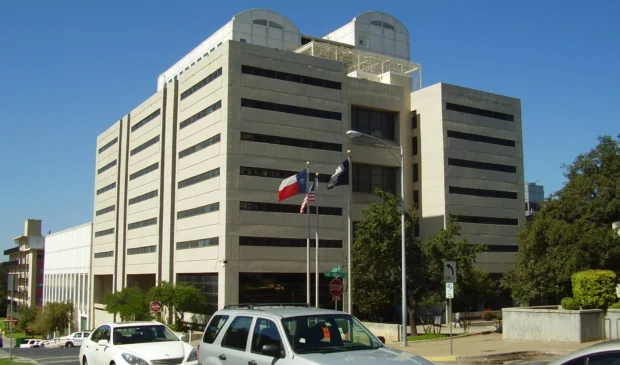County to fully staff lawyers at bail hearings beginning Oct. 1
Thursday, August 29, 2024 by
Lina Fisher Justice advocates have been calling for Travis County to instate Counsel at First Appearance (CAFA) – an integral part of the justice system that ensures everyone access to a lawyer at their initial bail hearing – for years. In the summer of 2022, the county implemented a pilot program that lasted only nine days because of a lack of staff and space at the jail. After mounting calls highlighting the importance of the right to legal counsel and an ACLU lawsuit for the lack of it, the county finally implemented CAFA test shifts this spring. Now, they’re planning to ramp up the program permanently – to one shift a day, seven days a week – by Oct. 1.
In a county meeting Aug. 27, commissioners approved the 39 new staff positions needed to achieve that. Eventually, to keep the program going and provide a second shift per day, the county will need 72 full-time employees, but right now, those 39 should be enough to fully staff up by the Oct. 1 start date – if county departments begin hiring immediately. Because of the rushed process, staff will come back with an updated recommendation tying up any loose ends or corrections needed by Sept. 17, wherein they’ll recommend the court approve an earmark in the 2025 budget.
The new positions span the county’s entire slate of justice services, including the Criminal Courts, Public Defenders’ Office, Capital Area Private Defenders Service (a private legal service that contracts with the county), Community Legal Services, District Attorney’s Office, County Attorney’s Office, Sheriff’s Office, District Clerk’s Office and Pretrial Services.
The Public Defender’s Office will take 25 percent of CAFA shifts, CAPDS will take 25 percent and the other 50 percent will be handled by a new division within Community Legal Services. Geoff Burkhart, county executive for CLS, stressed that it will “serve as a hub for the defense function administratively, making sure that we have basic kind of left-hand, right-hand coordination – that nobody’s slipping through the cracks.”
One of the most important new positions in the PDO, CAPDS and CLS is the caseworker, which Chief Public Defender Adeola Ogunkeyede said “is the piece that is across all the defense functions, and is really about handling people who are in crisis. Many times, the courts and the state are interested in well, what is the plan?” before they decide to release someone. “That’s where a caseworker comes in. Caseworkers will be on the ground, able to identify resources to help that person out of their crisis moment and give the court and the state confidence that to release that person is the right decision for the process. It will inevitably save us days that people would otherwise spend in jail, when plans are trying to be put in place.”
CAPDS, which will take a quarter of the shifts, also received funding from the county to provide a stipend for Spanish speakers and mental health professionals, “to keep the motivation the same for compensation and to recognize the effort and the skills that they bring,” said Bradley Hargis, director of CAPDS. Those skills will be essential for providing equitable justice to everyone, as currently 14 percent of these hearings require a Spanish interpreter.
Two Spanish interpreters were approved for the criminal courts before Oct. 1, but there are still outstanding recommended positions for interpreters and IT services that staff will bring back to commissioners for consideration in September. County staff warned that in-person interpreters require a special court designation and can be difficult to find, and floated the option of video translation services like LanguageLine that are currently in use. However, lawyers in the PDO that have worked CAFA test shifts told commissioners that in-person interpreters are some of the most important staff positions for CAFA to work equitably and provide clients both the range of languages and the privacy they require.
“While we can use LanguageLine to communicate between the judge at the bench and the attorney, there are times where an attorney needs to turn to their client and be able to talk to them up at the bench, and LanguageLine doesn’t necessarily enable that ability,” public defender Janel Venzant stressed. “If the judge is asking your client a question they’re confused about, I would have to come up and whisper it into the phone – it wouldn’t work for any sort of privacy or confidentiality.” Venzant also recounted a recent case in which she took a Mandarin speaker, highlighting the need for interpretation options for multiple languages, not just Spanish. Kathy Mitchell, a longtime advocate for justice reform, added, “What we know from practice is that having translation folks in the room at the time is the best way to give people the language capabilities they need to participate in the process.”
Aside from interpreters, another issue brought up by speakers from the Public Defender’s Office was the two magistrate judges needed in the criminal courts where the hearings take place.
“All the work and money that the county is going to put towards this may end up all being for naught if those individuals are people who don’t really support the values and principles that the stakeholders here have,” public defender Seth Manetta-Dillon warned. “There have been situations where the prosecutors and the defense counsel both agree this individual should be released on a PR bond, or on very low restrictions, and yet that particular magistrate disagrees for whatever personal reasons. If we’re going to hire two new county magistrates, I think it’s important that that process is transparent, that the individuals who are hired for those roles be able to answer questions from the stakeholders, from the citizens, from the county. Because they’re the ones who set the dollar amount that keeps somebody in or lets somebody out, and if they’re not in alignment with what I think most of us are, then all of this gets stopped right then and there.”
Overall, Venzant said from her experience working CAFA shifts, “it is massively important to empower attorneys to go meet their clients early on so we can establish that relationship. To the extent that this is a new expense, it is also what justice requires. It’s something that I would say is a stain on Travis County that has taken us so long to get here – we saved a lot of money over a lot of years by failing in this respect. So I just want to encourage Commissioners Court to not get too bogged down in the numbers, and remember that this is enabling the human element to enter into the criminal justice system as early as possible, and that’s deeply important.”
The Austin Monitor’s work is made possible by donations from the community. Though our reporting covers donors from time to time, we are careful to keep business and editorial efforts separate while maintaining transparency. A complete list of donors is available here, and our code of ethics is explained here.
You're a community leader
And we’re honored you look to us for serious, in-depth news. You know a strong community needs local and dedicated watchdog reporting. We’re here for you and that won’t change. Now will you take the powerful next step and support our nonprofit news organization?






